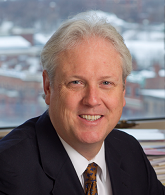Steven Hall (BS ‘81)

Position: Vice President for Alumni Relations
Employer: Boston University
Current City: Boston, MA
What does your job entail?
As Vice President for Alumni Relations, I’m responsible for leading teams charged with engaging alumni of BU – more than 300,000 of them – with Boston University and with one another. We do this through programs and events, communication, social media engagement, providing volunteer opportunities and, yes, soliciting critical philanthropic support for the University. I serve as a member of the University Leadership Group, and work closely not only with alumni leadership, but with Trustees, deans, faculty members and students. I also have the pleasure of traveling around the world to meet with alumni and have travelled extensively in Asia, Europe and the Middle East. I think what I enjoy the most about my job, in addition to the people I get to work with, is the range and variety of strategies and tactics I’m called upon to use on a daily basis. And, moving to Boston from Houston after 47 years, I’ve learned to be a hockey fan.
How did your political science degree influence your career path?
I’m a big believer in the value of a liberal education. I didn’t enter UH in 1977 with a clear idea of my career path. In fact, I don’t believe I declared as a Political Science major until I started my junior year. Looking back, it’s clear that the intellectual skills that I honed in my political science courses serve me on a daily basis. Institutions of higher education like BU or UH are large complex organizations with many stakeholders and my coursework gave me tools to understand organizational dynamics, politics, economics and cultures. What I do, like most industries, is very data driven and the ability to use data to make decisions about policies or practices is invaluable. These are all things I learned, but most importantly, UH, in general, and my political science studies, in particular, continued to develop my ability to understand complicated ideas, analyze them, and understand how those ideas shape organizations and society.
Do you have any advice for students who aspire to hold a job like yours?
The courses I enjoyed the most were those that made me think about things. Don’t sacrifice the theory courses because you want to learn something “practical” you can “use.” Trust me, you’ll use your ability to think much more than anything you learn to “do” in a class. Take science and math courses. I took calculus, physics and chemistry and use that knowledge every day although no one would accuse me of being a scientist or an engineer. Get involved in student organizations and take advantage of leadership opportunities. I didn’t live on campus but forced myself to be involved in everything from student organizations to intramurals. I certainly believe that being in the right place at the right time is a big part of life. I don’t undervalue fortuity. But, you also have to be aware of the opportunity and courageous enough to jump. I’m in the position I am in today because I never said “no” when leaders asked me if I would take on a new challenge. And, say “yes” long before you start asking about whether that means a pay raise or a title change. Those will come.
I don’t believe many people, if any, ever sat down with a career counselor in college and said, “I want to be a Vice President for Alumni Relations when I grow up.” Find something you have passion about. There are more than 1.5 million non-profit organizations in the U.S. alone. If your goal is to be rich, you may want to follow another path. If your goal is to add value to the world in meaningful ways, while making a comfortable living, there’s nothing more rewarding than advancing higher education. Working in advancement or alumni relations at a university provides me with the best of both worlds; the stimulation of working in an academic environment and the grounding of working with our alumni who are out in the “real world,” making a difference.